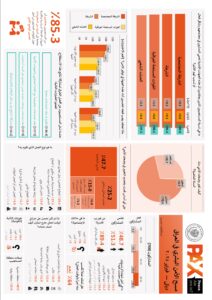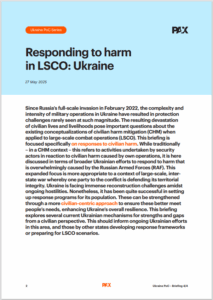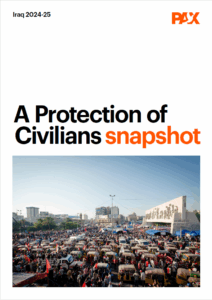HSS Community Engagement in Salahaddin, Iraq
The Human Security Survey (HSS) project has two key phases in Iraq – the data collection itself, followed by community engagement activities across the targeted governorates. The community engagement phase has a number of complementary purposes: (1) validating the survey findings and generating contextual qualitative data; (2) bringing members of the public and local authorities together to identify security priorities from the civilian perspective; and (3) providing communities with a means to hold their leaders more accountable for protecting civilians. The theory underlying this process is that if local authorities and security providers better integrate local perspectives when developing and implementing protection strategies, then civilian populations will experience improved security and have more trust in these institutions to protect them.
HSS teams in both Salahaddin and Basra facilitated dozens of public events and advocacy meetings in recent months, creating opportunities for hundreds of authorities and members of the public to discuss critical security issues and means of improving them.
Setting the stage
The HSS data collection team in Salahaddin, led by the Iraqi Al Amal Association, collected 673 surveys across 5 districts in April-May 2018. PAX then cleaned, analysed, and synthesised the data and provided the key findings back to the team in the form of infographics , detailed summaries of the data disaggregated by gender and by district, and more detailed narrative analysis about some of the key gender security dynamics in Salahaddin.
In October 2018 we met with our partners from Salahaddin, Basra, and Kirkuk together in Erbil for a 2-day joint learning event on community engagement. Based on experiences in this and previous survey cycles, this was an opportunity to celebrate the teams’ successes to date in conducting these dialogues, to openly discuss key challenges they’ve faced in achieving the intended results, and to identify opportunities for improving our community engagement efforts in the future.
Bringing the data back to communities in Salahaddin
After two intensive but interesting and productive days in Erbil, the partners travelled back to their governorates. For the team from Salahaddin, this marked the start of the community engagement phase. In the intervening 3 months, our partners from Al Amal organized 17 community engagement activities (CEAs) and participated in a conference on women’s empowerment issues at Tikrit University. In total, the team engaged with 432 participants (168 women and 264 men). The meetings reached a wide range of stakeholders with diverse perspectives, including women’s groups, youth, government officials (f.i. various members of the Provincial Council), police officers, IDPs, health care workers, tribal sheikhs, and academics (f.i. the President of the University, a number of deans, and the Director of Security). A final governorate-wide conference to follow up on all of these local events is planned for February 2019.
Generally speaking, each CEA kicked-off with a presentation of the main survey findings, with emphasis on findings most relevant to the specific geographic area or stakeholder groups represented. Some of the most important topics discussed during the meetings were community perceptions of: key factors causing insecurity, solutions for improved security, and gender dynamics. Recurrent themes affecting these topics were lack of basic services, lack of security provision, and lack of employment opportunities.
Often times these dialogues provide information on the effects of conflict not captured in the survey itself. For instance, during the CEAs it was mentioned several times that due to a lack of teaching staff (e.g. teachers and/or professors have left the area and not returned), the drop-out rate of students from school is high. One of the perceived risks is that youth might be motivated to instead join a formal or informal security force and start carrying weapons, especially since youth employment opportunities are lacking too). Other participants reported that some parents are forced to directly pay the wages for lecturers, which burdens the already strained economic situation of the families and exacerbates the perception that the government is not providing key services. In addition, public health workers argued that poor service provision in their field is mainly a result of mismanagement by the local government, wherein leaders are randomly appointed without regard for their qualifications of technical knowledge. Further, leaders’ salaries are paid out of operational budgets, resulting in fewer resources available to provide quality health services. One of the outputs of this session was to plan a coordination meeting with the Department of Health and local authorities to develop strategies to prevent intervention by the local authorities in health programs, as this is perceived as negatively affecting the provision of health services. Participants in other dialogues also mentioned the lack of electricity and water services to be significant issues in the area. In general, these reflections aligned with the survey findings, wherein 16% of respondents argued that the lack of access to basic services (like education, health care, electricity, or water) is a potential factor that could cause future conflict in the area.
Residents of Salahaddin appear to reflect positively on changes in the security context in their area. The Iraqi state proclaimed formal military victory over Daesh in December 2017, and a full 79% of our survey respondents indicated personally feeling safe from violence or crime when we conducted the survey a few months later. However, other survey findings and participants in the CEAs make clear that insecurity and inadequate security provision remain an issue. During one of the CEAs it was argued that citizens have lost confidence in the security services, which sometimes results in the fact that victims of violence don’t report incidents to authorities or testify against the perpetrator in courts. People argued that they fear that they or their families will be threatened as a result of doing so. (Note that in just 40% of all security incidents reported in the 2018 survey respondents did contact someone outside the household for help with resolving the incident. Of these, only 23% of these households reported being satisfied with the result.) Certain groups of people, including women and people living in more remote tribal areas reportedly face other barriers to justice. In the CEAs additional reasons for not reporting cases of violence to security services included: the fear of tribal punishment, the lack of protection for women’s rights, and the mistreatment of women who report cases of harassment. Youth also stressed they feel uncomfortable with the infiltration of security services in public life, and that they fear to be targeted by the security forces for forced recruitment.
In the survey, 68% of respondents pointed to “poverty and lack of livelihood opportunities” as one of the key factors most likely to cause future conflict in the community, and CEA participants agreed. The lack of employment opportunities in Salahaddin has reportedly increased due to the closure of many industrial facilities as a result of insecurity, like oil companies. Furthermore, regional disparities in the number of employees in health institutions and police offices were also raised as concern (i.e. it was mentioned that some districts only have 75 police officers, while in other districts the number of police officers goes up to 1000; similarly for health institutions which in some areas have about 840 employees, while in others only 270). However, in a meeting with high-level political and security officials it was argued that poverty and a lack of job opportunities do not cause conflict, but rather extreme ideologies triggered by political motives and/or tribal customs. This fundamental difference in how conflict dynamics are understood and should be addressed understandably creates tensions between authorities and civilian populations, and will continue to motivate us to facilitate these types of discussions through the HSS project going forward.
What comes next?
Our partners at Al Amal will soon conclude the community engagement phase of this survey cycle with a final conference in Tikrit in February 2019. Shortly thereafter the team will start working with PAX to make plans for the next iteration of the survey later this year. We will also take into account the many lessons learned from these community engagement efforts across Salahaddin governorate to help us better achieve our intended outcomes at the project level this year, and to continue to identify effective ways of improving the protection environment for civilians in Iraq in the future.
Follow our project updates here to learn more about current and future HSS activities in Basra, Salahaddin, and Kirkuk governorates.
About this news
Date of publication:
Jan 28, 2019
Author:
Marieke Meeske


